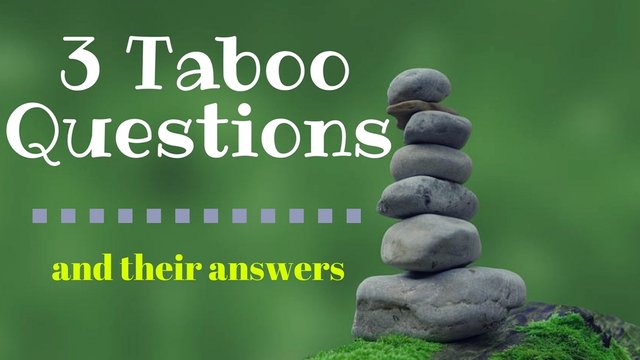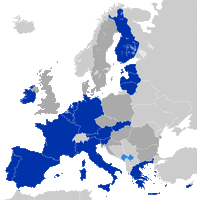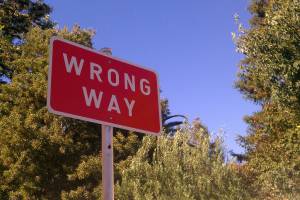Three Extremely Important Taboo Questions (And The Answers)

Please don't hit the back button when I say this, but you've just clicked on a post about macroeconomics. If you want to learn how to make central bankers squirm and understand why various problems exist in society, then keep reading.
There are three extremely important questions whose answers would make a seismic impact if they were known to most people. If politicians knew these, their countries would most likely enter a new era of prosperity which is unmatched in history.
Question 1
Can central banks ever run out of money?
You may or may not already know the answer to this one, but watch what happens when this question is asked to the head of the European Central Bank.
Squirmtastic! Central banks create money by typing numbers into a computer that they own. They can never run out of numbers, so they can never run out of money.
Despite what conspiracy theorists will try to force you to believe, central banks these days belong to governments. So, if the central bank creates money, that means that the government can never run out of money.
However, there are countries whose central banks don't create money, including countries in the Eurozone. That's right, the ECB can never run out of money, but the countries who use the Euro can. That's because there's no Eurozone Treasury to give instructions to the ECB to create money as and when it's needed. This is the opposite of a win button!
Not only that, but Article 123 of the Treaty of Lisbon prevents countries in the European Union from using their money systems to maximum effect. This is one of the reasons why they have austerity.
Question 2
Would the central bank ever bounce a government cheque?
An American economist named Warren Mosler was asked to give a talk to the Reserve Bank of Australia a few years ago and he asked that question to them. They didn't appreciate it. He describes the scene on page 23 of his highly entertaining and easy to read book, Seven Deadly Innocent Frauds of Economic Policy, which is available for free by clicking on the link.
I encourage you to at least read pages 23 and 24 to see how the central banker tried to deflect the question before finally saying that they would never bounce a government cheque.

I've also asked a similar question to the Reserve Bank of Australia and other central banks. When the question leaves room for ambiguity, they always, always try to make you believe that the answer is different. However, this one usually works for me, so feel free to test it out on your own central bank...
Would the
[enter name of central bank here] ever refuse to make a payment that has been requested by[Federal Government/National Government/Treasury] if the request has been made in the appropriate format and does not contravene any laws or sanctions?
Some central banks just flat out choose to ignore the question, but the Reserve Bank of Australia confirmed that they would never, as Warren Mosler had already confirmed, bounce a cheque from the Government of Australia (which comes via Treasury).
As I mentioned, I've also asked that question to a few other central banks, including the Bank of England, who said...
the Bank of England would not refuse a request for payment from a Government account held at the Bank, provided the request was done through the appropriate channels and was in line with the relevant regulations.
It may appear that they're saying that they'd use 'money' from the Government's account to make the payments, but that's just them being tricky, as you'll see from the next question. Once you see it, you'll be able to put the pieces together and see that they'd actually just said that they'd never bounce a government cheque.
Question 3
This is a sneaky one on my part. I wanted to know if the government needs to collect money from taxes, etc., before it can spend, but I knew that no central bank would never answer a direct question like that. I had to ask in a way that they'd be happy to answer. Here it is in plain English...
Does the government ever have any money in their accounts at the central bank (or any domestic commercial bank)?
...and here's the same question in economist-speak...
Do the balances of any of the accounts held by Government (including all ministries, offices, etc.) which are denominated in [national currency] constitute any part of the monetary aggregates?
When I asked the Reserve Bank of Australia, the answer was no, the government never has any money in it's accounts. It may sound strange, but then if you look at the Department of Finance website, they are always careful not to use the word 'money', but instead mention account balances.
However, when I asked the Bank of England, they said that the Government of the United Kingdom actually does have a couple of accounts that have money in them. I looked into it and it turns out that these accounts are only used for bond transactions rather than government spending, so they have nothing to do with taxes.
Why are taxes collected if the money gets destroyed immediately? Well, taxation is a tool for controlling inflation. If the government didn't collect taxes, then one of two things would be likely to happen.
- We could get hyperinflation.
or - People would stop using the currency because they don't need it to pay taxes anymore. I'd just like to say that I'd be happy to see cinema tickets and snack bar coupons used as currency in such a situation (I love going to the cinema), but it's more likely that people would try using cryptocurrencies instead.
What Does All of This Tell Me?
The central bank receives instructions to create new money every time the government spends. That's one way that money comes into existence. That money then ceases to exist (as money) when taxes are paid (the money gets demonetised).
Accountants are able to understand this really well because they understand double entry bookkeeping, which makes them more qualified to run a central bank than anyone who currently runs a central bank.
Why Does Any Of This Matter?
Remember when the U.S. Government was talking about the 'fiscal cliff' a few years ago? It's complete nonsense - they can never fail to make a payment in US dollars, unless they choose failure.
In 2017, I lost count of how many newspaper headlines I saw about Australia's AAA credit rating being at risk of a downgrade. The whole thing is a con! Warren Buffet said that governments who have their own currency should have a AAAA rating. I'd say they should either have an infinite A rating or no rating at all, because they're totally meaningless!
- "Urrr mah Grrrd, we're gonna go broke paying interest on the National Debt!" No, you're not!
- "We need to tighten our belts, cut spending and increase taxes." That's the opposite to what you should do if your economy is sluggish.
- "We need to collect taxes to pay for things." Wrong again, buddy! See the answers to questions 1 and 2.
- "We need a balanced budget or budget surplus." If you think it'll help the economy to grow, you're wrong!
- "I have a PhD in economics from one of the World's most prestigious universities, so I know what I'm talking about." You have been mal-educated and should hand back your PhD because top universities teach macroeconomic myths and pass them off as facts. That's why things haven't been getting better.
Conclusion
The World doesn't need austerity. Countries who have their own currency don't need to borrow from the IMF or World Bank and sell off public assets. The size of government is not a monetary decision (what matters more is the amount of real resources that are available). Credit rating agencies are giving bad advice that will bring poverty rather than prosperity. This is all because they didn't ask three simple questions!


It all sounds like one big con game. So who actually benefits from the Universities teaching this bad advice? And from this bad advice being acted upon by ill-unformed 'experts'?I have my ideas, but I do tend towards the conspiracy side of the explanation.
I had no trouble reading through your explanations, and found it to be a good read. And that's no easy task given the subject matter.
Thanks for sharing your insights on this topic.
I don't like conspiracy theories, so I'm a bit hesitant to answer your questions because...
When it comes to preserving the AAA rating, the advice that credit rating agencies give to governments is that they must achieve a budget surplus. This can be done by either cutting spending, increasing taxes and/or selling off public assets. The most politically acceptable of these three options is to sell off public assets. Historically, governments sell them cheap to people who have lots of money! If these assets are monopolies, then that makes things even worse for society.
Every time I see a newspaper complaining that Australia's AAA rating is under threat, there are people from the Big 4 banks, giant securities firms, and others who would be involved in the sales transaction saying that the government must achieve a surplus for the sake of the economy. It's all rather infuriating once you understand what it really means.
Thank you for your answer. Do you have any idea where the tax dollars end up, if they aren't in the government bank accounts? That's the bit I couldn't quite comprehend.
They get destroyed.
Think of how it looks on a balance sheet when money is created - the central bank creates the money as a liability to itself and an asset to whomever is receiving the money.
When the money comes back in taxes, the asset is given back to the central bank and it then cancels the liability on its balance sheet.
The Australian Tax Office doesn't accept notes for the payment of taxes. However, if someone in the US pays dollar bills to the IRS, those notes are thrown into a shredder. You can buy the shredded dollars, if you want.
Okay thank you. You did explain that in the post, but I guess it didn't fully sink in. Not having any accounting training it probably went past me. But I think I get what you mean. So is this 'double-entry accounting?'
Yes, double entry bookkeeping. Basically, every entry is a + to one person and a - to another person. When you add the +’s and -‘s together, you should always get 0.
Just discovered your posts today and now I have a lot of catching up reading to do for your previous posts (a shame I couldn't upvote them to increase the payout though). Seems like you have a great interest and knowledge in this subject matter, would be keen to hear more of your thoughts about the blockchain economy :)
I’m still catching up on replying to comments, so good luck catching up with the posts. ;o)
If you have any requests for things to discuss, I’ll write something if I have any knowledge on it.
The idea of universal basic income on the blockchain is something that has been discussed. I am actually not a fan of passive income, and this is concept of universal basic income seems to be a variation on a theme. I am curious about universal basic income from the economics point of view. I will probably write something about the fallacy of passive income shortly though...
If you give someone monopoly control over a road and allow them to stick a toll booth on it, they collect money from people without having to earn it.
There are toll booths all over the economy. That's how wealth gets transferred from the hands of the many into the hands of the few.
If everyone were to suddenly receive an increase in income across the board, tolls would increase. The toll booth owners would benefit and no one else would. Inequality growth would be accelerated.
If you tax the toll booths instead of taxing people for being productive, it would fix this problem. That's the only way people would benefit from UBI, but they probably wouldn't need a UBI anymore because the economy would become a hell of a lot more prosperous without the toll collectors (economic rent seekers).
Couldn't agree more and couldn't have put it in words better myself. I think that passive income also offers a false sense of financial security because then you become dependent/reliant on that source of income and therefore lose your ability to produce value and be a productive member of society, which is where real financial security should come from - contribution to a greater cause and exchanging value with others.
I was just reading an anarchists post he had become fixated on the fact that the Australian government had registered business under abs and asic and insisted that such an act was proof that the entire gov was infact a corporation.
He could not fathom any legitimate reason to have a provision to register a business under the government entity provision for such.
I only mention this because the business he took issue with was the Dept of Finance in Australia
Not the entire federal government and certainly not the departments. There are entities that are registered as corporations, though.
yeah I don't buy the federal gov being a business or company but some of the departments are registered as such dept of finance
There are also private companies that are controlled by the government departments because the work or business that these companies are involved in are tightly controlled by government regulations. But I don't see why government departments can be registered as a business - is that not a conflict of interest?
Feels like it but the provision for the listing is "government entity" there is a page over on the dept finance website that talks about why it happens and what the structure looks like but i lost the dam link
You did well to find the link in the first place :D Australian Government websites are notorious for those not so obvious links :p
Great article. Very enlightening for those who pay attention to these types things. What are you thoughts on how the crypto world is going to affect that climate, if at all?
I don't see any sensible reason for a government to surrender their sovereign currencies and decide to collect taxes in crypto instead. If a country does do that, they'll probably become an example to the rest of the World as to why that's a bad idea (it would be like going back to the gold standard).
I think it's much more feasible to see community currencies becoming more widely used, especially in digital form. Eurozone countries who are struggling economically would be much better off if they were to create a community currency that's used nationwide and it should be the only currency they accept for the payment of taxes. Or they could just run multiple currencies locally. Either way, there'd be more money in the real economy, where it's needed to create jobs.
Heard that. So , are we saying crypto couldn't solve a micro-economic crash in a specific country? Or just saying, if it is the instrument, do both? Apologies, if they seem like ignorant questions, not well versed in details like these.
Anything can be used as money, the only problem is in getting people to accept it as money.
If people decide to start using crypto as money, then the problem is like something out of Goldilocks and the Three Bears - is there too much, too little or just the right amount? Anything other than the right amount will cause problems.
As governments have control over such things with their currencies (including local governments controlling community currencies), they have the tools to be able to deal with crashes. The problem is that they lack the know-how for the modern system and try to use it as though it’s the same as the old system. It’s like making a computer behave like an abacus and insisting that it needs more beads before you can enter more numbers.
Yes, perfect example! Thank you. I understand that for sure. Old hardware. Doesn't the nature of mining cryptocurrency help alleviate the pressures of finding just the right amount, because it dynamically grows with use, and trust?
It dynamically grows with speculation and the pursuit of capital gains.
Right now, most crypto is hoarded, which makes it scarce. If the people who hold it decided to use all of it to buy stuff, the exchange rate with other currencies would come down.
What if they buy stuff with in that currency's market? Driving up it's utility.
You mean a crypto that isn’t pegged to another currency or a market that only accepts that crypto and nothing else?
I downloaded Mosler thanks - not perused it all, but an entertaining read indeed, confirming especially my perception that, with rare exception, economists at large suffer a fatal disconnect from reality.
And where I stand now, I am not even vaguely interested in finding remedies for any of the ailments of the current economic model - it is fundamentally flawed, not only in terms of the misconceptions you bring to our attention, but in terms of its premises, and needs to be replaced in toto.
Forgive me for being so brief, but I need to get some sleep. I agree with you 100% that the world needs everything but austerity - and with all else you say in conclusion. Maybe pressing a magic reset button can give the current system a new life, that could deliver prosperity for a while, but in the end the same ailments are likely to set in as before - also compounding the irreparable damage already done to the world in the previous cycle.
Hope we can work out something sensible here!
Plenty of sensible things in your comment. Hitting the reset button might work, but it might be easier to point out to the status quo how the system they have right now could work if they used it properly and educated them on the things that used to be done that worked before. Mentioning a reset button would scare the knickers off of them.
The only reason I say this is because I talk to economists who work for government departments, etc., and they become terrified as soon as you mention policy. That's why I focus on talking about the mechanics.
Thanks for the acknowledgement. In the current South African scenario talking sense to government simply has no effect for two major reasons - too much at stake for the ones in power positions and too little understood by everyone.
We have had two Ministers of Finance attempting to curb corruption swapped out within months by a corrupt government. Re-educating intelligent economists is challenging enough. Getting their influence behind the doors of parliament may require a bloody revolution.
Is it much different elsewhere?
South Africa has a very interesting employment guarantee program, so I commend the government for trying to address the issue of unemployment.
Here in Australia, our politicians make their corruption so plain that they publicly request industries whose lobbyists fund them to remember how so-and-so helped them. The public simply turn a blind eye.
Fascist government capture has become more visible lately, with the president and his cronies being exposed to be extensively involved with a Gupta-McKinsey alliance, the latter association apparently featuring internationally from the early '90s, starting in India and somewhere in-between having a showdown in American courts as well. They seem to have a taste for taking control of energy resources.
Wow, i usually dont read posts like this because people suck at explaining facts! But you did a great job in this article. I like that u left links and videos to show what you are talking about. I really like ur style!
I dare say the government uses our tax dollars fornwhat ever they want to use it for. After all, who governs the government?
@jeejee
Congratulations! This post has been chosen as one of the daily Whistle Stops for The STEEM Engine!
You can see your post's place along the track here: The Daily Whistle Stops, Issue #18 (1/16/18)
The STEEM Engine is an initiative dedicated to promoting meaningful engagement across Steemit. Find out more about us and join us today!